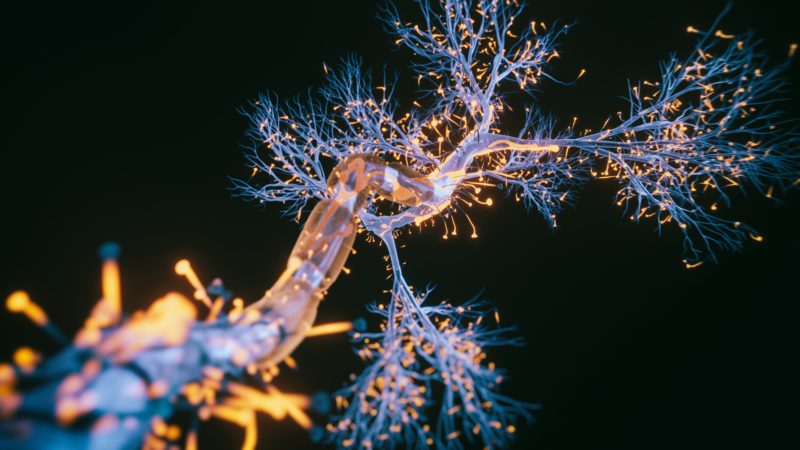Alzheimer’s timeline shows changes start as trickle, become torrent
A study of cells from 84 cadaver brains suggests that Alzheimer’s has two distinct phases, and that one type of neuron is especially vulnerable.
“There’s an early phase where there’s a very slow increase in the amount of pathology,” says Ed Lein, a senior investigator at the Allen Institute for Brain Science in Seattle, “then a more exponential phase where suddenly things get really bad.”
The study also found evidence that a small subset of neurons known as somatostatin inhibitory neurons begin to die off during the early phase of Alzheimer’s, Lein and a team of nearly 100 other scientists report in the journal Nature Neuroscience.
“That was quite a surprise,” Lein says, because these neurons have received relatively little attention from Alzheimer’s researchers.
The findings suggest that Alzheimer’s treatments are most likely to help early in the disease, and that one strategy might be to protect vulnerable inhibitory neurons.
The results also show how scientists’ understanding of Alzheimer’s is being changed by new tools and techniques that can reveal detailed information about millions of individual brain cells.
“They’ve produced a picture of what’s going on that no one could have anticipated just a few years ago,” says Dr. Richard Hodes, who directs the National Institute on Aging, which played a key role in funding the research.
Tracking brain cell changes
The study looked at more than 3.4 million cells from the brains of people who died at age 65 or older. Some had healthy brains, while others were in various stages of Alzheimer’s.
The team focused on an area called the middle temporal gyrus, which is involved in language, memory, and vision.
By comparing cells taken at different stages of Alzheimer’s, scientists were able to create a timeline showing how the disease alters the brain.
“We measure all the genes in each individual cell,” Lien says. “That allows you to not only identify those cells, but look for changes in those cells as a result of disease.”
Some of the changes confirmed earlier research. For example, cells related to immune function in the brain became more active.
Lein says artificial intelligence and new imaging and genetic techniques allowed the team to search for other changes that previously would have gone undetected.
“We were looking for vulnerable cell populations, for example particular types of neurons that might be specifically lost early in disease,” Lein says.
The team had expected to find changes to excitatory neurons, which form connections to distant areas of the brain and act like the accelerator in a car by encouraging other neurons to fire.
“But it turns out that the first cells lost are actually some of the inhibitory neurons,” Lien says.
Inhibitory neurons act like the brake in a car by forming connections with nearby excitatory neurons and controlling their activity.
The specific type of inhibitory neurons that appear to die off early in Alzheimer’s release a chemical messenger called somatostatin, which is known to decline in Alzheimer’s patients.
Somatostatin neurons help control the activity of brain networks involved in memory and thinking.
Any decline in these cells could upset the delicate balance between inhibitory and excitatory neurons in the brain. Epilepsy and some other brain disorders are thought to be the result of an imbalance.
“It could be that the loss of these [somatostatin] inhibitory neurons is causing a hyper-excitatory state which may be contributing to disease,” Hodes says.
If that’s the case, Hodes says, treatment would need to start before too many inhibitory neurons are lost. And the new study suggests that may be possible,
“The fact that there is a process early on that is slow is an inviting opportunity to intervene,” he says.
Party City files for bankruptcy and plans to shutter nationwide
Party City was once unmatched in its vast selection of affordable celebration goods. But over the years, competition stacked up at Walmart, Target, Spirit Halloween, and especially Amazon.
Sudan’s biggest refugee camp was already struck with famine. Now it’s being shelled
The siege, blamed on the Rapid Support Forces, has sparked a new humanitarian catastrophe and marks an alarming turning point in the Darfur region, already overrun by violence.
FDA approves weight loss drug Zepbound to treat obstructive sleep apnea
The FDA said studies have shown that by aiding weight loss, Zepbound improves sleep apnea symptoms in some patients.
Netflix is dreaming of a glitch-free Christmas with 2 major NFL games set
It comes weeks after Netflix's attempt to broadcast live boxing between Jake Paul and Mike Tyson was rife with technical glitches.
Opinion: The Pope wants priests to lighten up
A reflection on the comedy stylings of Pope Francis, who is telling priests to lighten up and not be so dour.
The FDA restricts a psychoactive mushroom used in some edibles
The Food and Drug Administration has told food manufacturers the psychoactive mushroom Amanita muscaria isn't authorized for food, including edibles, because it doesn't meet safety standards.







